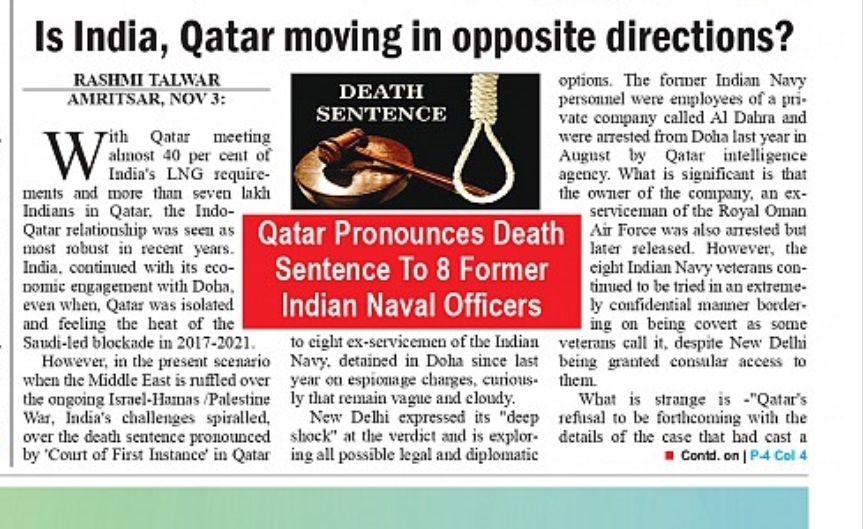WC 624

Is India, Qatar moving in opposite Directions?
Rashmi Talwar
AMRITSAR November 2nd 2023— With Qatar meeting almost 40 per cent of India’s LNG requirements and more than seven lakh Indians in Qatar, the Indo-Qatar relationship was seen as most robust in recent years. India, continued with its economic engagement with Doha, even when, Qatar was isolated and feeling the heat of the Saudi-led blockade in 2017-2021.
However, in the present scenario when the Middle East is ruffled over the ongoing Israel-Hamas /Palestine War, India’s challenges spiralled, over the death sentence pronounced by ‘Court of First Instance’ in Qatar to eight ex-servicemen of the Indian Navy, detained in Doha since last year on espionage charges, curiously that remain vague and cloudy.
New Delhi expressed its “deep shock” at the verdict and is exploring all possible legal and diplomatic options. The former Indian Navy personnel were employees of a private company called Al Dahra and were arrested from Doha last year in August by Qatar intelligence agency. What is significant is that the owner of the company, an ex-serviceman of the Royal Oman Air Force was also arrested but later released. However, the eight Indian Navy veterans continued to be tried in an extremely confidential manner bordering on being covert as some veterans call it, despite New Delhi being granted consular access to them.
What is strange is –“Qatar’s refusal to be forthcoming with the details of the case that had cast a shadow and now with a formal declaration of the death sentence, New Delhi is perturbed about its citizens and the reasons thereof”, says an insider.
For most Indians, it has not only been disconcerting to see their retired servicemen being treated like this but it has also raised questions about the very nature of India-Qatar ties which seem to be propelled by energy and people-to-people engagements.
New Delhi managed to build remarkably strong ties with the Arab states in the Gulf. Looking beyond just energy ties and diaspora linkages, the Indian approach to the region assumed a strategic depth and character, making way for a wider regional policy response instead of merely bi-laterals as reflected in the emergence of that I2U2 (India, Israel, UAE and the US) mini-lateral. Incidentally, there is also a framework agreement on defence and security cooperation signed in 2008 that envisages maritime training, joint exercise and enhancing defence manufacturing bases of India and Qatar.
For Qatar, building robust ties with an emerging economic power like India was a priority as it sought diversification in its external relationships, while for New Delhi it has been about strengthening partnership with a Gulf state.
However, the Israel-Hamas conflict and the challenges it has thrown up, have complicated intra-regional ties. Qatar’s decision to challenge the foundations of an essentially strong relationship with India will push in a counter thought i.e. to rethink the future sustainability of the India-Qatar ties. According to some reports- the case of eight naval personnel of India relates to allegations of spying for Israel which adds another layer of complexity to the problem when the world is increasingly being divided over the rivals Israel and Palestine.
Watchers of foreign affairs feel –“If this crisis is not resolved in an amicable manner, future cooperation between India and Qatar will be difficult to envision”. Prof Harsh V. Pant, Vice President – Studies and Foreign Policy at The Observer Research Foundation, New Delhi writes – “The timing and severity of the punishment meted out by the Qatari court are confusing, but its implications for India’s ties with Qatar can be far-reaching. Qatar’s lack of sensitivity to Indian concerns about extremist voices at another time could have been brushed aside, but those pertaining to ex-Indian servicemen could cause lasting damage to this relationship”.
00–00










